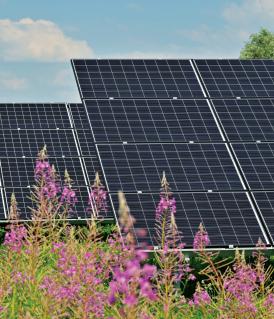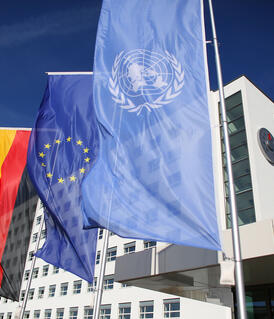Climate policy pioneer

Germany aims to become a climate-neutral industrial nation by 2045. This puts the Federal Republic at the forefront of international efforts to combat the climate crisis. The planned energy transition is key to success, involving a rapid shift from fossil fuels to renewables. Germany has already phased out nuclear power, the last three German nuclear power plants having been shut down in 2023. It has also decided to phase out coal-fired electricity generation by 2038 at the latest.
Germany’s climate policy is guided by:
- the UNFCCC,
- the 2015 Paris Agreement,
- the 2030 Agenda and
- the principle of climate justice.
Under the Paris Agreement, the international community set itself the target of keeping global warming well below two degrees Celsius and below 1.5 degrees if possible. The Federal Government Federal Government The Federal Government and cabinet is made up of the Federal Chancellor and the Federal Ministers. While the Chancellor holds the power to issue directives, the ministers have departmental powers, meaning that they independently run their respective ministries in the framework of those directives… Read more › is consistently working towards this climate protection target. Protecting nature and the environment have also been high on the agenda in Germany for decades.
What does the German climate protection law stipulate?
Explicit guidelines for climate protection have been set down in law since May 2021. The law requires Germany to reduce its greenhouse gas emissions Greenhouse gas emissions Roughly two thirds of global warming caused by humans (anthropogenic) can be attributed to carbon dioxide emissions. The gas is produced when the fossil fuels gas, oil and coal are burned. They all contain carbon which combines with atmospheric oxygen to form carbon dioxide. In addition to carbon… Read more › by at least 65% compared to 1990 levels by 2030. This figure is to reach 88% by 2040 and by 2045 Germany must ultimately achieve greenhouse gas neutrality. This means there is a balance between the generation of greenhouse gas emissions and their removal from the atmosphere.
There have already been substantial cuts to greenhouse gas emissions in Germany since 1990. By 2024 emissions were down by around 48.2% to 649 million tonnes. However, this figure must be reduced to 438 million tonnes at the most by 2030.
Germany aims to become a climate-neutral industrial nation by 2045.
What is the current status of the energy transition?
The energy transition is the defining project of this century and the Federal Government Federal Government The Federal Government and cabinet is made up of the Federal Chancellor and the Federal Ministers. While the Chancellor holds the power to issue directives, the ministers have departmental powers, meaning that they independently run their respective ministries in the framework of those directives… Read more › intends to make decisive progress this decade. By 2030, 80% of Germany’s energy needs will have to be met by renewable sources such as wind or solar power. The original plan was to phase out coal by 2038 at the latest, but now this goal is ideally to be achieved significantly sooner. Coal-fired electricity generation is considered one of the most serious causes of harmful CO2 emissions.
Security and economic policy Economic policy In line with the federal system, structuring and coordinating economic and financial policy is the joint task of central government, the federal states and municipalities. They cooperate in various committees. Furthermore, the Federal Government seeks the advice of independent economists. Every… Read more › concerns make it necessary to implement the energy transition as quickly as possible. The Federal Government intends to use measures such as speeding up planning and approval procedures for solar and wind power facilities to support the restructuring of energy supplies.
Renewable energy has greatly increased as a proportion of gross electricity consumption since 2000.
How Germany is boosting climate protection internationally
The target of limiting temperature rises can only be achieved if the international community works together. Developing countries that do not have the necessary financial resources must be supported accordingly.
With the EU “Green Deal”, Europe aims to become the first climate-neutral continent by 2050. To this end, Germany’s support includes reforms to EU emissions trading and a CO2 price escalator, which will incentivise climate protection.
Germany supports partner countries worldwide through bilateral climate and development partnerships, and through the G7 Just Energy Transition Partnerships (JETPs). In addition, Germany is making around 5.7 billion euros available for climate protection and climate adaptation in developing countries in 2023.
Protecting the environment - a national objective
Germany is also committed to improving protection for the natural world and biodiversity, both at home and internationally. Since 1994, the Basic Law The Basic Law The Basic Law determines that Germany is a constitutional state: All state authorities are subject to judicial control. Section 1 of the Basic Law is of particular relevance. It stipulates that respect for human dignity is the most important aspect of the constitution: “Human dignity shall be… Read more › has required the state to protect the natural environment. The Action Plan on Nature-based Solutions for Climate and Biodiversity is one way the Federal Government Federal Government The Federal Government and cabinet is made up of the Federal Chancellor and the Federal Ministers. While the Chancellor holds the power to issue directives, the ministers have departmental powers, meaning that they independently run their respective ministries in the framework of those directives… Read more › is boosting efforts to maintain biodiversity (the diversity of genes, species and natural habitats). A total of 3.5 billion euros is available until 2027 for the programme, which aims to help restore natural ecosystems such as forests, meadows and moorland.
Germany is also actively engaged in promoting species protection, such as under the Washington Convention. The Convention protects endangered plant and animal species from excessive exploitation by international trade. Around the world over a million species are threatened with extinction, with many at risk of dying out in the next few decades.


